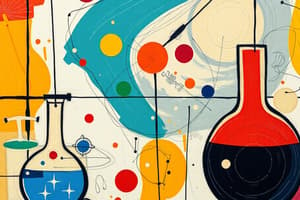Podcast
Questions and Answers
What is the basic approach of science in determining what is true?
What is the basic approach of science in determining what is true?
The basic approach of science is to propose a hypothesis and test it through experiments to see if it holds up against evidence.
How does inductive reasoning differ from deductive reasoning in scientific inquiry?
How does inductive reasoning differ from deductive reasoning in scientific inquiry?
Inductive reasoning involves forming hypotheses based on observations and is speculative, while deductive reasoning involves deriving conclusions that must logically follow from true premises.
What is the role of evidence in the scientific method?
What is the role of evidence in the scientific method?
Evidence serves as the final arbiter of scientific truth, determining whether a hypothesis is supported or contradicted by observations.
In what way does science advance according to the content provided?
In what way does science advance according to the content provided?
What is a hypothesis in the context of the scientific method?
What is a hypothesis in the context of the scientific method?
What does parsimony refer to in scientific hypotheses?
What does parsimony refer to in scientific hypotheses?
How is biology defined in the context of science?
How is biology defined in the context of science?
What does it mean to say science uses inductive reasoning?
What does it mean to say science uses inductive reasoning?
What distinguishes a scientific theory from a simple fact?
What distinguishes a scientific theory from a simple fact?
How does science contribute to human civilization?
How does science contribute to human civilization?
What is required for an idea to be considered part of science?
What is required for an idea to be considered part of science?
What is the smallest unit of life that meets the criteria for being an organism?
What is the smallest unit of life that meets the criteria for being an organism?
Explain what is meant by a self-correcting aspect of science.
Explain what is meant by a self-correcting aspect of science.
What is the basic definition of life in biological terms?
What is the basic definition of life in biological terms?
List two examples of scientific theories in physics.
List two examples of scientific theories in physics.
What role does logic play in the practice of science?
What role does logic play in the practice of science?
Flashcards are hidden until you start studying
Study Notes
Understanding Science
- Science is a method for determining truth through empirical evidence.
- It relies on external testing of ideas to confirm or refute assertions.
- Evidence serves as the ultimate judge in scientific discourse.
The Role of Biology
- Biology focuses on the empirical study of life forms and living processes.
- It involves testing hypotheses related to living organisms against evidence.
Scientific Methodology
- Scientists propose a hypothesis to explain phenomena and test it through experiments.
- Inductive reasoning is employed to formulate hypotheses, leading to probable conclusions based on evidence.
- Conclusions from inductive reasoning are not guaranteed, inviting a degree of speculation.
Inductive vs. Deductive Reasoning
- Inductive reasoning allows for creating multiple plausible hypotheses but cannot confirm their correctness.
- Deductive reasoning provides absolute conclusions based on true premises, allowing for definitive predictions.
- The empirical process helps science distinguish valid hypotheses from incorrect notions over time.
Progression of Scientific Knowledge
- Science advances through the disproof of incorrect ideas rather than outright proof.
- It comprises both the process of investigation and the accumulated knowledge.
- Claims that cannot be tested scientifically fall outside the realm of science.
The Dynamics of Scientific Theories
- Theories are broad explanations that connect various observations across disciplines.
- A theory must generate testable predictions consistent with evidence to be considered valid.
- Major scientific theories include:
- Cosmology: Big Bang Theory
- Physics: Atomic Theory, Thermodynamic Theory, Quantum Theory, Theory of Relativity, Theory of Gravity
- Geology: Theory of Plate Tectonics
- Biology: Cell Theory, Germ Theory, Endosymbiotic Theory, Theory of Evolution
Definition of Life
- Life is defined as a self-perpetuating biochemical system capable of growth, response to stimuli, and reproduction.
- Organisms, which are complete living entities, range from single cells to complex multicellular systems with trillions of cells.
- The cell is recognized as the smallest unit fulfilling the criteria for life.
Studying That Suits You
Use AI to generate personalized quizzes and flashcards to suit your learning preferences.





